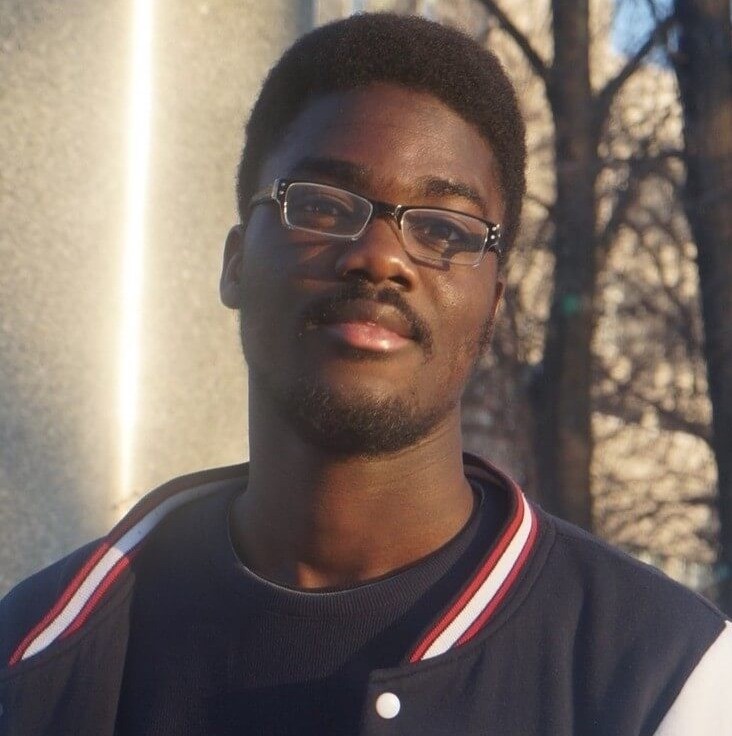What is your educational background?
I guess you can say that my educational background is science and kind of diverse. I got my high school diploma in Biology. After, I completed one year of Software Engineering before moving to Russia where I successfully completed my 5-years undergraduate studies in Mathematics with honors. I am now a Master’s Student in Data Engineering at Jacobs University Bremen.
What is your current occupation?
I am currently a Master’s student in Data Engineering at Jacobs University Bremen, and a research intern at MILA Quebec AI Institute.. As far as my research is concerned, it is more Artificial Intelligence oriented especially in the fields of Computer Vision (CV) and Natural Language Processing (NLP). I am the co-author of the FFR: Fon-French Neural Machine Translation project, which aims to create efficient translation systems for African languages that would translate not only among themselves but also between African and Western languages, ensuring the safeguard and promotion of these languages, integral parts of our cultural heritage. I am the author of the F-SER20, a Speech Emotion Recognition’s intelligent system available for German, English, and Italian. I am also into computational biology and network sciences approaches in Biology and Medicine, because I believe that is where the future is.
What or who got you into STEM?
I have always been in STEM because I have always had a passion for everything linked to science, technology, engineering, and mathematics. I particularly developed a passion for computer science since I was a child, and got my first laptop when I was 6 years old. It could also be because my dad was trained as a geometer expert and daily dealing with mathematics.
What is the biggest challenge/barrier you have faced as an African in STEM?
I would say resources, grants, and supports. Talking about my little journey in AI, when I talk about it around me, my peers seem to take me as a dreamer if not a fool. Very few adhere and believe in the power of AI contribution in the development of the world in general and African particularly. As a result, my projects and systems I developed so far have received no support. Other things are projects: most great internships or projects require a PhD degree. This really makes me sad because it makes me feel like I am losing or letting great opportunities go by where I could acquire knowledge and experience. I always apply to them but rarely I get answers back if not negative ones.
How do you think your background/upbringing has been beneficial in your journey/career?
I believe that many of the norms that I learned helped me to grow up in my career. I have always given my 200% in everything I do. People see me as a leader because where people think it is not possible, I always try to find a way out. I think it is because all my life I have learned to have confidence in myself and in my ideas. I give up very hardly, and some will call it stubbornness. I deeply and humbly believe my success thus far as a scientist is due to the perseverance, discipline, and work ethic that has been instilled in me. I always finish what I start, no matter how hard things get. I go full force and even sometimes non-stop without break and giving up; and because of that my neighborhood even calls me “robot” (lol). In case of success, that feeling of satisfaction is just genuine but if I fail, I always learn something and use it to explore new or better ways. I hate quitting and I always tell myself, “Bona, you can succeed at anything as long as you have the right amount of passion”.
How do you think we can start to change the narrative surrounding African contributions
to global STEM research & careers?
I think efforts like these, highlighting the contribution of African scientists is a great first step. We should focus on educating ourselves and the generations after us. African researchers in all, I think need recognition for their work and lots of support. We are full of talents but the lack of those two things makes great works and minds remain in the dark – forgotten, or unknown.
What advice would you like to give to young, aspiring Africans in STEM?
You can be successful with the right amount of passion. We are here to live and leave an unforgettable mark to the world: we are here to make our life worth living and useful. So don’t let negativity and lack of resources deter you from your dream. Whoever thought one day, a device called ‘plane’ would connect us to the other side of the world? It all starts by a dream. In science, we are limited by our creativity. So let’s always dream big, and wild.
Do you have any projects you’re working on that you would like us to highlight?
Yes, the FFR Project. As I mentioned earlier, the goal of this project is to create efficient translation systems for African languages that would translate not only among themselves but also between African and Western languages. This will ensure the safeguard and promotion of these languages, integral parts of our cultural heritage. Given the profound lack of documentation in these extremely tonal languages, it is important to launch a war on data and look for as many written transcriptions, expressions, vocabularies, and dictionaries as possible. Our first step was the establishment of the FFR project (Fon-French Neural Machine Translation), which advocates the collection of large-scale data (FFR Dataset) and the creation of a Fon <-> French translation system; a language with very limited resources, spoken by 38.6% of the population of the Republic of Benin.







